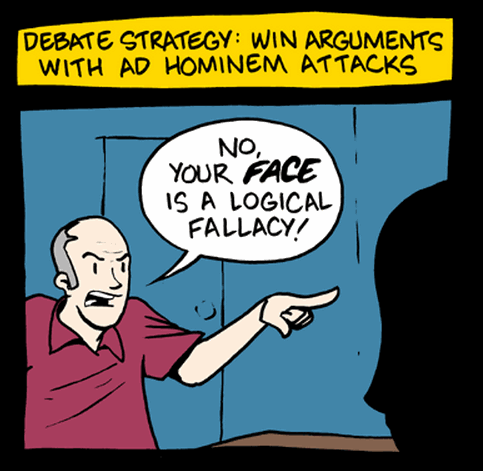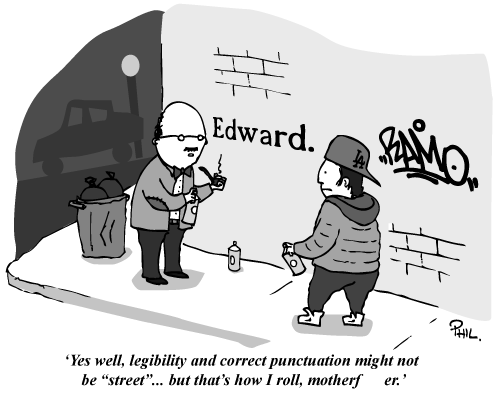The Universal Rules of Civilized Discourse
With Discourse, it was clear that we needed to totally reboot the software to create next-generation forum software. But code is only part of the story. Any reasonable attempt at delivering a Civilized Discourse Construction Kit has to provide a safe, simple default set of guidelines for civilized discourse.
Today's forum software has a default FAQ that tells you how to make bold text, but absolutely nothing about how to moderate your forum, deal with trolls, appoint moderators, or even how to get people to visit your forum in the first place. The hard-earned sociological lessons of these 10+ year old forum communities are not being baked into their forum software at all.
These guidelines don't have to be complex, but they need to exist in every forum instance. Even the drive through window at McDonald's has a set of simple guidelines they expect visitors to abide by:

So why doesn't the average Internet forum?
This is something we set out to fix with Discourse.
Steal Learn from the Rest
But what is civilized discourse online? We decided to use science, or at least sociology: what have existing forums learned in the last four decades of typing paragraphs to each other? Are there any common principles of civilized discourse embodied in the current generation of online forums?
Our goal is to generate a set of community guidelines that:
- Cover the common themes and rules in most established, stable 10+ year old web forum communities.
- Are short enough to skim without becoming an unreadable wall of text, or an enormous volume of rules.
- Have a positive, upbeat, and agreeable tone.
- Establish a reasonable set of defaults for every future forum predicated on actual, honest to goodness civilized discourse.
We dove deep and looked the community guidelines for about 50 different forums/BBSes/Groups that have been around for at least a decade, reviewing well over 100 documents in total. Here are a few of the sites and forums and platforms we reviewed:
Ars Technica, AutoSport, AVSForum, Blue’s News, Elitist Jerks, FARK, Geekdo, The [H]ard Forum, Home Theater Forum, NASIOC, NeoGAF, NeoWin, Offtopic, Overclockers, Penny Arcade, Proboards, Quarter to Three, The RPF, RPG.net, Something Awful, Stack Exchange, Straight Dope, Through the Looking Glass [TTLG], World Works Games, Yahoo! Groups
We tried to cover gaming, hobbyist, family, political, and professional use cases. Please note that we do not endorse any of the content on these forums. We only studied their rules and guidelines as forum sociologists.
I used a spreadsheet to track every issue I saw covered, and for a particular site I would see if the issue was addressed, in which document, and how. Here’s a portion of the list of features that we found in our survey:
| single account | kitbash rules | no porn | session IP disclosure |
| moderation appeals | lurk before posting | cc provision | limited “adult” behavior |
| right to refuse service | no whining | anything goes subforum | cooperate with moderators |
| vandalism, tampering, abuse | no preemptive content review | do your homework first | post sparingly |
| mods have total authority | no ad blocking | refund/deactivation policy | coppa |
| don’t be a jerk | instant short bans | right to remove content | no alts |
| no competitive links | be civil | do not spam or promote | site indemnity for user content |
| no armchair mods | abusive, vulgar, hateful | user content is public | signatures allowed |
| site has copyright | limited language | profane, threatening, invasive | content disclaimer |
| don’t cross/multi post | site “sole owner” of posts | use descriptive subject lines | inaccurate, harassing, obscene |
| false, defamatory | be brief/succinct | user limited republish rights | no excessive foul language |
| no trolling | is/encourages illegal activity | edit/delete limited | personal info is confidential |
| no juvenile toilet humor | insults and personal attacks | minimum age 13+ | hate speech |
| legal exceptions to confidentiality | catchall rules (not here) | copyrighted and fair use | no personal agendas |
| valid email required for use | strikes/points for infractions |
On the surface, most forum social rules look very different from each other and have names such as Community Guidelines, Commandments, Rules of the Road, FAQ, Tips for Gettin’ Along, and Forum Rules. Sometimes these rules are mixed in with the TOS and are harder to find and tease out.
These guidelines set the the tone for the community - they describe what it is about and attempt to nurture the discourse into a specific style, from caring to cordial to combatative. But, when you dig deeper, they do share a surprising number of common principles. These shared principles, across all these established web forums, are the foundations of civilized discourse as it exists on the web today. Let's briefly walk through each part of the Discourse Community Guidelines FAQ and discuss the research that led us to formulate each section as we did.
Don’t be a Dick!
Many forum rules had an overarching theme, which could be summed up in Wheaton's Law: “Don’t be a dick!” In fact, Fark and Penny Arcade actually cite this “law” verbatim. Many other forums say something similar, without the colorful metaphor such as Flickr’s “Don’t be creepy”. Others state this idea in a more positive light, such as Board Game Geeks' Short List: Use Common Courtesy & Respect Others.

We distilled all this down to:
This is a Civilized Place for Public Discussion
Please treat this discussion forum with the same respect you would a public park. We, too, are a shared community resource – a place to share skills, knowledge and interests through ongoing conversation.
These are not hard and fast rules, merely aids to the human judgment of our community. Use these guidelines to keep this a clean, well-lighted place for civilized public discourse.
Kinda like a positive version of Wheaton's Law: “Be good, because this is a nice place.”
If only this were sufficient! Despite all the various wordings of “play nice”, every single forum has to detail what constitutes “being a dick”, “common courtesy” or “respecting others”.
Improve the Discussion
Although we tried our best to keep it short, new community members may not read beyond the first few paragraphs, so we set the tone as quickly as possible: community first, self second.
Improve the Discussion
Help us make this a great place for discussion by always working to improve the discussion in some way, however small. If you are not sure your post adds to the discussion or might detract from its usefulness, think over what you want to say and try again later.
The topics discussed here matter to us, and we want you to act as if they matter to you, too. Be respectful of the topics and the people discussing them, even if you disagree with some of what is being said.
One way to improve the discussion is by discovering ones that are already happening. Please spend some time browsing the topics here before replying or starting your own, and you’ll have a better chance of meeting others who share your interests.
Q&A sites such as Stack Overflow live or die based on the quality of the content, and so spend the largest portion of their FAQs on contribution quality. Forums optimize for discussion quality, not necessarily content quality. Nonetheless, this principle is important to many existing forums as well.
- Something Awful’s Lurk before you Post rule, including "Does my reply offer any significant advice or help contribute to the conversation in any fashion?"
- The first line of Offtopic’s Site Rules explains “In an attempt to promote good fellowship and to improve overall site content...”
- the RPF’s Statement of Purpose lists four goals: Collaborate, Share, Showcase, Cultivate Community.
Conversations are about frequent back and forth replies, to be sure. But every reply should make an honest effort to respond to, and build on, the conversation.
Be Agreeable, Even When You Disagree
In 2008, Paul Graham wrote How to Disagree. We like that essay so much that we basically lifted an entire section from it, verbatim.
Be Agreeable, Even When You Disagree
You may wish to respond to something by disagreeing with it. That’s fine. But, remember to criticize ideas, not people. Please avoid:
Name-calling.
Ad hominem attacks.
Responding to a post’s tone instead of its actual content.
Knee-jerk contradiction.
Instead, provide reasoned counter-arguments that improve the conversation.
As Paul noted, the web is indeed turning writing into a conversation. Rare is the web page without a conversation going on around it somewhere, either on that website or elsewhere. It's also true that the most energetic conversations are often born of strong disagreement. Mr. Graham outlined an excellent set of guidelines that teach us how to disagree with someone – strongly, if necessary – while not undermining the conversation with incivility.
Name-Calling and Ad Hominem attacks are explicitly against the rules in almost all forums I surveyed. Many forums explicitly encourage more respectful forms of disagreement.

Interestingly, there are specific sub-forums in various communities where the gloves come off, and these things are not prohibited. Segregated “relaxed rules” areas are not uncommon:
- As described in Top 7½ Tips for Getting’ Along on NASOIC, the Off-Topic forum includes the key guidance "enter at your own risk the natives may not be very friendly."
- Quarter to Three’s Religion & Politics subforum
- Penny Arcade’s Social Entropy
- Something Awful’s FYAD
Yes, there are exceptions, but if your goal is civilized discourse, we strongly recommend that you remain thoroughly agreeable, even as you choose to disagree.
Your Participation Counts
The life of a forum is user participation. In previous iterations, that was pretty much limited to reading, writing, and flagging posts. But where we choose to post says as much about the forum as our post does. Are we actively wading into every flame fest and meme repetition contest out there, or are we contributing thoughtful, considered replies to interesting topics? As noted in the Dogster community guidelines, "There is no shortage of places on the Internet to fight, scratch and snarl; we thought it was high time to have a place that was all about the kindness and fun of sharing and communication".
Though reading and posting are still critical to any forum community, in the age of social media there are many more options for user contributions, such as: favorites, likes, bookmarks, edits, forking, categorizing, ratings, etc. All of these activities contribute to improving the quality of discourse and setting the tone for each particular community.
Your Participation Counts
The conversations we have here set the tone for everyone. Help us influence the future of this community by choosing to engage in discussions that make this forum an interesting place to be – and avoiding those that do not.
Discourse provides tools that enable the community to collectively identify the best (and worst) contributions: favorites, bookmarks, likes, flags, replies, edits, and so forth. Use these tools to improve your own experience, and everyone else’s, too.
Let’s try to leave our park better than we found it.
For this guideline, we drew lessons heavily from newer community platforms, such as Stack Exchange, Huddler, and XenForo which have numerous non-post user contribution mechanisms (up-voting, ratings, trust).

Lowering the barrier to participation encourages users – as described in Amy Jo Kim's classic Community Building on the Web – to make their way from mere visitor, to eventually becoming a regular, and perhaps in time a leader or even an elder. Communities rely on experienced members to set the tone for new users in their posts and behavior.
If You See a Problem, Flag It
As long as there have been web forums, there have been moderators - whose job ranges from cheerleader to facilitator to police to janitor.
Sometimes their relationship with users can become needlessly adversarial, and the community guidelines often reflect the tension between these roles. This can make the job thankless and contributes to high turnover rates, not to mention friction within the community.
Trust and reputation systems make it feasible to empower the community to take on some of the more “janitorial” moderation functions. Which is a godsend, since the problems like spamming and trolling are mentioned prominently in every set of community guidelines we reviewed!
If You See a Problem, Flag It
Moderators have special authority; they are responsible for this forum. But so are you. With your help, moderators can be community facilitators, not just janitors or police.
When you see bad behavior, don’t reply. It encourages the bad behavior by acknowledging it, consumes your energy, and wastes everyone’s time. Just flag it. If enough flags accrue, action will be taken, either automatically or by moderator intervention.
In order to maintain our community, moderators reserve the right to remove any content and any user account for any reason at any time. Moderators do not preview new posts in any way; the moderators and site operators take no responsibility for any content posted by the community.
Like Discourse, Geekdo at Board Game Geeks implements a form of user driven moderation, allowing voting and flagging of posts - automatically hiding content when it meets a threshold. But, they also urge people not to pollute the spammed/trolled thread by posting a reply. Calling someone a “troll” in a post, even if true, is prohibited. This is feeding the trolls. Likewise at Penny Arcade, where this a violation of the Glorious Edict. It is also a violation of Rule 1 at Overclockers.

Though every forum may have different policies on hiding/removing content, all moderation models benefit from easy user reporting of problem posts. This frees the moderators to nurture the creation of good content, instead of spending all their time taking out the trash.
Always Be Civil
After setting the tone for the community, and calling for participation (the “Do”s), we turn to the “Don’t”s. Every single forum’s behavioral rules include an explicit list of of things you should not post, usually including private information, spam, explicit images, offensive, abusive, or hate speech, amongst others. This “Don’t List” mentality is prevalent amongst forums. For example on Through the Looking Glass the vast majority of the posting regulations are prohibitions.
Nothing sabotages a healthy conversation like rudeness:
- Be civil. Don’t post anything that a reasonable person would consider offensive, abusive, or hate speech.
- Keep it clean. Don’t post anything obscene or sexually explicit.
- Respect each other. Don’t harass or grief anyone, impersonate people, or expose their private information.
- Respect our forum. Don’t post spam or otherwise vandalize the forum.
These are not concrete terms with precise definitions ”” avoid even the appearance of any of these things. If you’re unsure, ask yourself how you would feel if your post was featured on the front page of the New York Times.
This is a public forum, and search engines index these discussions. Keep the language, links, and images safe for family and friends.
We added the appearance guideline as a reminder that successful communities aren’t about the letter of the law, but how we treat each other in our conversations.

An earlier draft of this guideline said “If you’re looking here to see if something about your post violates the rules, you’re thinking about this the wrong way.” Respect for others should always be implicit and assumed, not constantly cross-referenced against a giant list of things you shouldn't do.
Keep It Tidy
Now we’re moving from discouraging the worst problems to avoiding bad habits. There are a collection of lesser forum hygiene items that are typically included in the larger communities guidelines.
Make the effort to put things in the right place, so that we can spend more time discussing and less cleaning up. So:
- Don’t start a topic in the wrong category.
- Don’t cross-post the same thing in multiple topics.
- Don’t post no-content replies.
- Don’t divert a topic by changing it midstream.
- Don’t sign your posts – every post has your profile information attached to it.
Rather than posting “+1” or “Agreed,” use the Like button. Rather than taking an existing topic in a radically different direction, use Reply as a New Topic.
Hygiene in the small is important. Forgetting to brush your teeth one day is no big deal, but if you don't get in the habit of regularly brushing your teeth, you may find yourself eventually spending a lot of painful, expensive time at the dentist's office. And who wants forum cavities?

All forums had some form of “Stay on Topic” admonition and its subcategories: cross-posting, categorization errors, etc. Though, as mentioned earlier, several larger forums provide off-topic areas allowing active users to let their hair down and talk about politics, religion, or whatever.
We found three policies that tended to be radically different from one forum to the next:
- Who has the right to republish forum content? The forum owner? The users? The public?
- Post signatures, those little blocks of text and images attached to each post by a user as a form of expression, or mini-profile. Many forums prohibit such signatures outright, such as Straight Dope, and Stack Overflow. Others allow and even encourage them. Discourse believes rather strongly that signatures should be discouraged in any modern forum software, but certain communities may still disagree.
- Identity and "alts", that is, one person using several alternate identities to post on the same forum. This ranges from a ban-worthy offense (Neowin, TTLG, most others) to completely encouraged (rpg.net, Elitist Jerks, World of Warcraft forums).
There is no consensus on the above three items, so tread carefully.
Post Only Your Own Stuff
There’s a lot of confusion about who gets to post what text, images, video, and audio to web forums. Ripping a movie DVD and posting it on the Internet is illegal – for most people. Anyone hosting a forum in the United States is required by law to comply with the DMCA or they will get shut down.
Every TOS and Community guidelines we reviewed had a provision prohibiting illegal activity, including copyright violations.
Post Only Your Own Stuff
You may not post anything digital that belongs to someone else without permission. You may not post descriptions of, links to, or methods for stealing someone’s intellectual property (software, video, audio, images), or for breaking any other law.
We circulated earlier drafts of the Discourse community guidelines to a few forums for comment. This section led to the only common response: What about LOLCats?

Our policy is the same as that of icanhascheezburger, and we quote: "you further agree that you will not submit material that is copyrighted – unless you are the owner of such rights or have permission from their rightful owner to post the material and to grant Cheezburger all of the license rights granted herein."
I Can Haz Cheezburger provides a handy, easy-to-find comprehensive DMCA takedown procedure. If they didn't, they would not be in business for long, and neither would the average forum owner.
TOS and Privacy Policy
The Privacy Policies all turned out to be standardized boilerplate – so is ours.
Terms of Service
Yes, legalese is boring, but we must protect ourselves – and by extension, you and your data – against unfriendly folks. We have a Terms of Service describing your (and our) behavior and rights related to content, privacy, and laws. To use this service, you must agree to abide by our TOS.
For the Terms of Service, we used the Creative Commons WordPress TOS as our starting point. There are system settings to customize it with your company name, domain, and so forth.
The User Content License section of the TOS is the one that varied the most amongst forum operators. We’re discussing how to make the user content licensing decision simpler, and you're welcome to participate.
Just Add Water
The principles in the default Discourse community behavior FAQ were distilled, as best we could, from the common, shared community guidelines of more than 50 forums active for a decade or more. We hope that anyone can launch a Discourse-powered forum community with confidence, knowing that they’ve got the basic guidelines for civilized discourse covered.

I'm not sure we got it 100% right, and every Discourse forum is completely free to modify these default guidelines in any way they see fit. But we feel the current guidelines are a giant step forward for online discourse, and do justice to the concept of the Civilized Discourse Construction Kit we set out to make.
(For further discussion, see the related meta.discourse topic.)